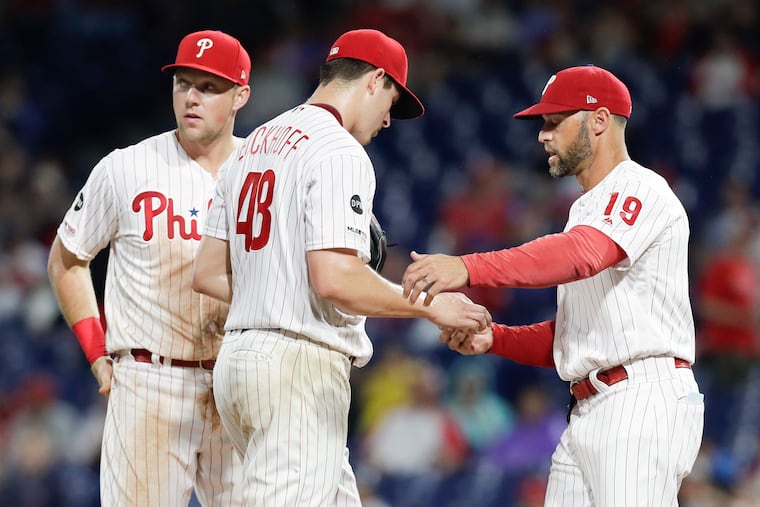The Phillies don’t have many options when it comes to fixing their starting rotation | David Murphy
As obvious as the decision to demote a scuffling Jerad Eickhoff to the bullpen was, it's not clear which decision the Phillies can make next.

There’s only one way out of a predicament like the one the Phillies face at the back end of their rotation: Don’t get into it in the first place. Gabe Kapler wasn’t going to acknowledge that on Tuesday afternoon, for obvious reasons. The Phillies were still tied for first place, still 2-1/2 games ahead of the sixth-place team in the National League wild-card standings, still plus-19 in run differential. True, he’d just wrapped up the latest installment of his seasonlong speaking series with players who are no longer in the rotation, this one featuring Jerad Eickhoff. But as was the case when he’d previously summoned Nick Pivetta, Cole Irvin, and Vince Velasquez to his office, Kapler wasn’t about to cop to a lack of options.
“I don’t think there’s many clubs that have a fifth starter that is so dependable that it’s never in question," Kapler said. “I guess what I’m saying is I don’t think what we’re dealing with is any different from what a lot of clubs are dealing with, which is trying to get a very capable starter on track and consistent.”
Still, you have to think he knows it. At least on a subconscious level. Somewhere beneath the layers of calm and collection that wrap his solution-driven psyche, there must exist a flicker of understanding that there is both too much season left and too much that has already been played for things to be this way. The Phillies do not currently have five major-league-caliber starting pitchers, and with seven weeks to go before the trade deadline, there won’t be another one walking through that door anytime soon.
Kapler’s decision to remove Eickhoff from the rotation Tuesday wasn’t a decision at all. After allowing five home runs to the Diamondbacks on Monday night — three to the first three hitters he faced — the 28-year-old right-hander was in need of a break. In his last six starts, Eickhoff has allowed a near-impossible 16 home runs in 27 1/3 innings — this, after not allowing a home run in his first 31 innings of the season.
Yet as obvious as the decision was, it still isn’t clear whether the Phillies have any better alternative.
“I think everything’s on the table,” Kapler said.
But when everything is on the table, it means the table is bare. As with quarterbacks: If you’ve got more than one, it means you’ve got none.
Moving Velasquez back into the rotation would only risk compounding matters by disrupting his transition to late-innings reliever. Young right-hander Enyel De Los Santos started Tuesday night for the IronPigs and would be on full rest by the time Eickhoff’s turn in the rotation comes up again Sunday. But before Tuesday, he had not thrown more than 66 pitches since late April, and the Phillies have been reluctant to give him another start since the two spot appearances he made last season. Kapler dismissed the possibility of top pitching prospect Adonis Medina getting the call-up, although he would not rule out the chance that such a moment arrives at some point this season.
Which essentially leaves three possibilities: one, the Phillies go with an “opener” and put the game in the hands of a bullpen currently operating without its top four and arguably five relievers from spring training. Two, they go back to Irvin, a lefty who is back in Lehigh Valley after allowing 13 runs in 21 1/3 innings. Three, they can take advantage of Thursday’s off day to put Jake Arrieta on the mound on normal rest, but that would only kick the can down the curb a few more days.
Whatever they decide, the issue isn’t going away. Really, the problem isn’t that the Phillies don’t have a No. 5 starter. It’s that they have two or three of them, at least in terms of production this season. As Kapler noted Tuesday, plenty of playoff teams have gotten through a season by treating the fifth day as a perpetual audition. The Phillies themselves did it in 2009, cycling through Chan Ho Park, Rodrigo Lopez, and Antonio Bastardo before acquiring Cliff Lee at the trade deadline. The big difference is that team averaged more than five runs per game and finished the season with the National League’s No. 1 offense. This current team simply does not have that kind of firepower, not even if Scott Kingery continues to hit like the player many people think he can be (the 2009 team had four hitters who finished the season with an OPS+ that was at least 29 percent better than league average. Rhys Hoskins and Bryce Harper are the only current Phils who have ever done it).
More so, though, the issue is that Aaron Nola and Arrieta have not pitched like a No. 1 and a No. 2. If that were the case, the Phillies could get by with Zach Eflin and a resurgent Nick Pivetta at No. 3 and No. 4, and then live with whatever every fifth day offers. As it stands now, they are just 4-23 in games in which they score fewer than four runs.
By no means is any of this a deal-breaker. If Nola returns at least partially to the form he displayed last season, and if Pivetta really has turned a corner, the Phillies should be able to grind their way through the trade deadline (Pivetta allowed just two home runs in 20 innings since returning from the minors). But even with a healthy and effective bullpen, the Phillies would still enter the trade deadline facing significant pressure to make a move.
That’s hardly an ideal circumstance in which to make a deal. But, then, it is the circumstance they face, and there’s no changing that now.